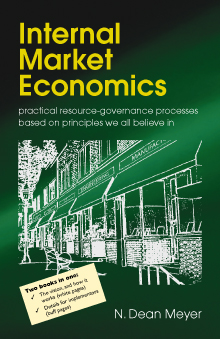| Excerpt from www.NDMA.COM, © 2025 N. Dean Meyer and Associates Inc.
Executive Summary: Investment-based Budgeting
submit a budget for what you want to "sell," not just what you want to spend
Speech Abstract"Do more with less!" "Cut your travel and training." Last year +/- a percentage. Expectations way out of line with resources. Unreliable funding for infrastructure and innovation (or even essentials like training and technology refresh). Lack of perception of value. Accusations that you cost too much. Controversies over allocations or chargebacks. Unfair comparisons to outsourcing. It all adds up to the wrong dialog — defending costs instead of collaborating on strategic investments. And it all comes from the same root cause: the way you present your budget. Consider the traditional budget — a forecast of what you want to spend on expense-codes like compensation, travel, and training.... How can executives judge the ROI on compensation, travel, and training? They can't. Your costs aren't linked to the value you deliver. Meanwhile, you're setting yourself up for micro-management of your costs, the opposite of a businesslike discussion of investment opportunities. The alternative — "investment-based budgeting" — forecasts the costs of the products and services you plan to deliver, as well as what you plan to spend. Then, budget decisions can be based on the needs of the business and the investment opportunities you offer. Executives will understand the value you deliver. Your internal customers will step forward to defend your budget. Costs are managed and strategic alignment is assured when your internal customers forego marginal deliverables to free up funding for more strategic initiatives. And instead of absurd demands like "do more with less," you'll leave the budget process with a clear understanding of what's funded, and what's not, the basis for managing expectations. This presentation explains the shortcomings of traditional budget processes, how investment-based budgeting works, and the steps in the process of developing a meaningful, effective investment-based budget.
Outline
|


